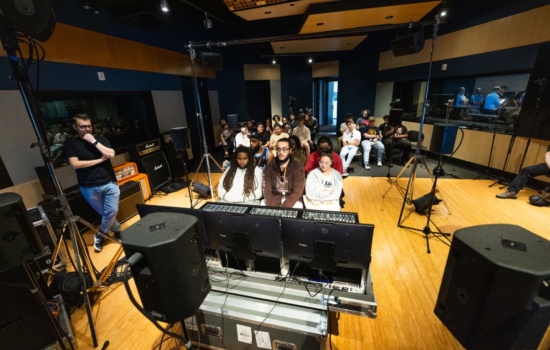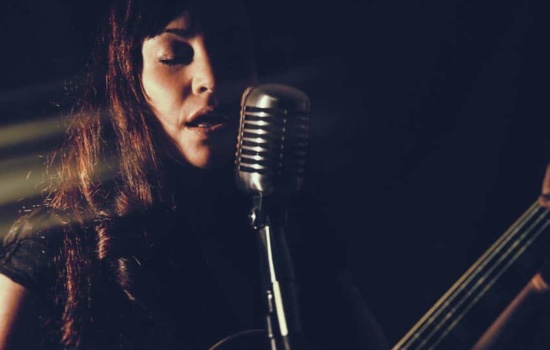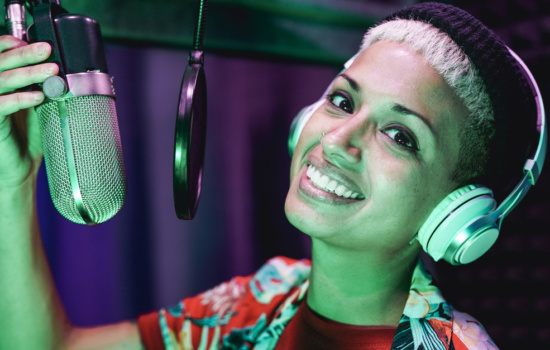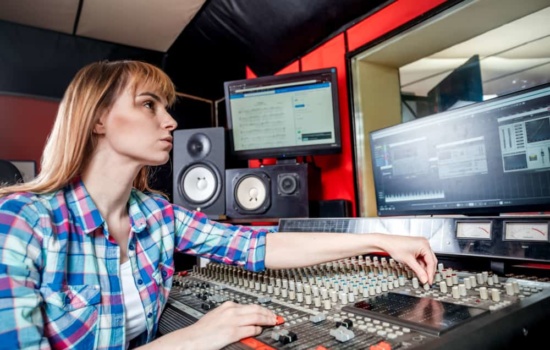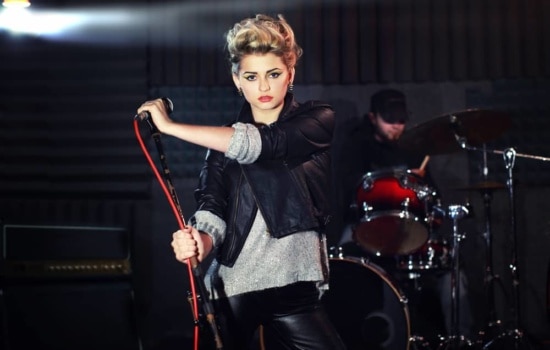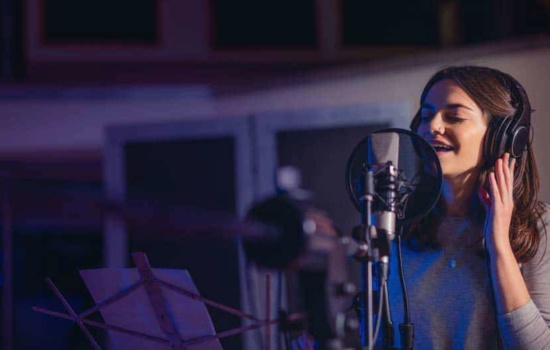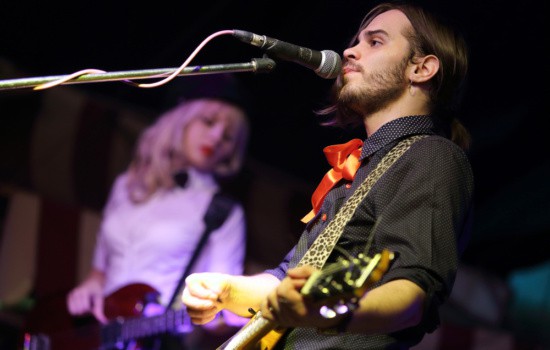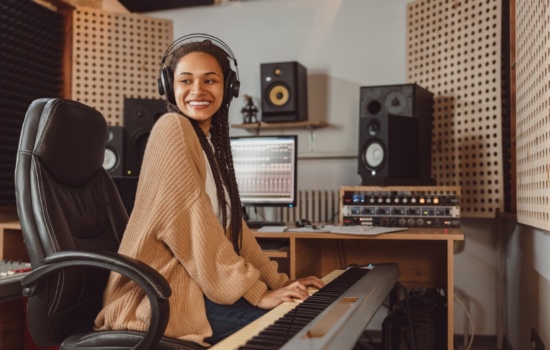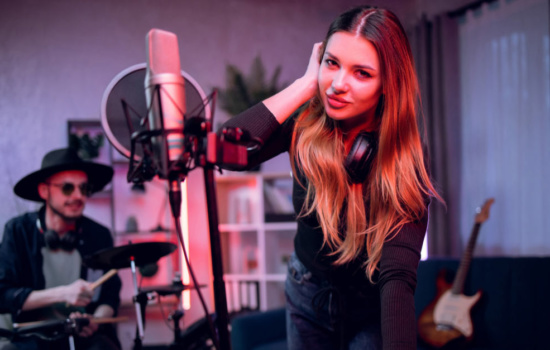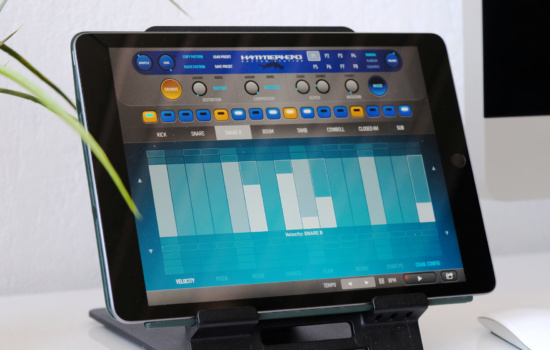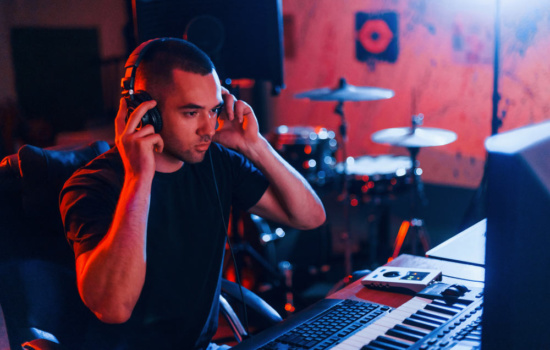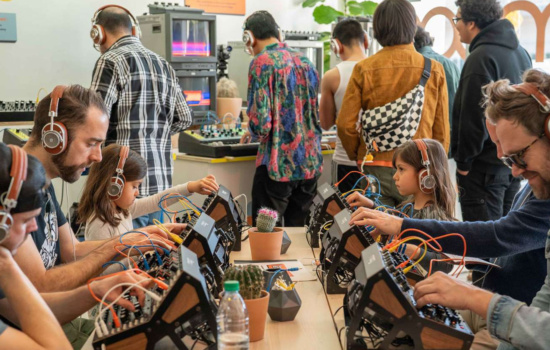Singer
Career Overview
Singers record albums and perform live with a band. Singer-Songwriters also write their own tracks.
Alternate Titles
Vocalist, Pop Star
Salary Range
$0 – $170,000,000

How To Become a Singer
People also ask
Career Description
The singer, or vocalist, sings the vocal parts in the music. The lead singer is the main focal point of the song for the listener. Whether in the recording booth or on a live stage in concert, the singer’s job is to deliver the song melody and lyrics to the audience. Background singers must blend their voices and sound to support the music.
Singers may also use dancing and movement as a part of their stage performance. Some singers play instruments such as guitar or piano to accompany their vocal performance.
Singers usually work with a live band, a DJ, an orchestra, solo accompanist, or use recorded backing tracks. They sing songs they have written, cover songs, or music that’s been written for them by a production team. Their days are spent in the studio, on tour, in rehearsals, or practicing their singing, instrumental, or dancing skills.
Singers must quickly learn the vocal parts to the music and then perform them at a high level. They must master many techniques beyond just singing the parts, for example proper microphone technique, movement, and how to follow a conductor.
They also need to take good care of their voice, since their instrument is physically part of their body and needs to stay healthy to sound good. This means understanding how the voice works and how to overcome vocal health challenges by practicing proper breathing, posture, and other techniques related to producing a consistently pleasing sound without damaging the vocal cords.
Singers should also be musicians. This means understanding the basics of music theory, how music is arranged and produced, and the various performing techniques required of all musicians, such as blending their sound, counting bars and beats, and giving and following cues (signals from the conductor or other musicians).
They must learn how to communicate effectively with the other musicians and with their audience. With many techniques to learn, aspiring singers often choose to attend music school or take private lessons with an accomplished vocal teacher and coach.
Singers also learn to work with solo accompanists, or accompany themselves on an instrument. They learn all about how music is put together, so they can have input into the arrangement, figure out their best key for a song, and work together in groups with other singers, musicians, and producers.
Most singers specialize in a specific style of music, such as pop, jazz, rock, musical theater, or opera. Other singers cover many styles or sing on jingles (music for advertising). Certain singers specialize in background vocals, which is surprisingly more difficult than singing lead since they must be able to blend their voice well in a group of singers.
The most successful singers enjoy huge popularity with audiences, touring the world, working with prestigious musicians, producers, and orchestras, and winning accolades, recognition, and Grammy awards. They are also among the highest-paid musicians in the industry.
To learn about what it’s really like to build a career as a singer or singer-songwriter, we talked to artists from a variety of genres:
- Grace Davidson
- Violet Skies
- Lainey Wilson
How can someone become a famous singer fast?
These days, TikTok, if I’m being super honest. I know it doesn’t sound like the answer that people want, but it kind of is. Or Instagram.
I came from a tiny little village in Wales … It seemed to me that people were doing music, and I didn’t know how I could be in those rooms. I didn’t know how I could be at those festivals and those stages. I think what it takes is for a Manager or a label or a Publisher to recognize your talent.
So, it’s putting stuff online. Going to gigs. Joining music clubs. Even if you’re young like 15, there are all sorts of youth jazz orchestras, youth pop writing courses, or summer camps that you can do.
You need to meet as many musical people as you can and someone will eventually recognize you from that. I’ve written a bit with Bülow and she was found at summer camp, I think in Canada. Other people were found at youth music groups and all sorts of stuff.
Get out there and play with your band at open mic nights. You’re less likely to be spotted at something like that because that’s not necessarily where industry people are. But just put yourself in the spaces where the kind of music artists you love are—these days, you can go online to find them.
It took me a long time to figure some of this stuff out, and I kind of wish someone had been around when I was 15 to explain that … there’s no shortcut. You have to put the hours in.
I think you kind of have to put your pride aside and don’t expect someone to come find you. Put yourself out there. Sometimes it can be almost embarrassing because you feel like you’re promoting yourself. But you just have to do it because everybody is, and there’s so much noise online. But real talent really does cut through. You see it time and time again.
I think the biggest key to getting noticed in the music industry is focusing on being one-of-a-kind, unique, and bringing something to the table that no one else can. When you own what you do, the passion shows, and people take notice.
Is it hard to become a famous Singer?
Becoming a Singer is exceptionally hard but at the end of the day, it’s rewarding. If you try to go after anything with a plan B, plan A is not going to work. You have to be willing to listen to people, take constructive criticism, and grow. Nothing happens overnight. And even though I make a living singing, I am still learning and growing every day.
If you want to be a Session Musician, that’s difficult, most definitely. But there are a lot more paths into it. Singing for other people or being a Backup Singer; singing in a professional chorus; those opportunities truly exist. But being a successful artist, the numbers are so much harder. You’re playing a game against lots of other people who want the same spots as you.
So yeah, it’s really difficult. And I don’t think people understand quite how difficult it is. Because you’ll go for a really long time not being paid in the early years sometimes. If you start early like I did … when I was 15, I was doing shows, and they’d pay you like £10. Or if I was underage and I was in pubs, they would just pay in food.
It’s really hard and you have to really want it. It’s not rocket science, but it requires a large amount of determination, which often, people find hard.
What does a Singer do?
My typical day, if it wasn’t COVID … I would get up in the morning, go on my phone and answer emails from my Manager. Deal with anything that needs to be done. Those would be emails about songs that need approval, because I write for other people. Or an email about gigs that I need to say yes or no to, or tours, stuff like that, and then sometimes, organizing my songwriting sessions during the day.
Then after that, go to the studio for … if it’s in the U.K., 11:00 a.m. or midday. If it’s in the U.S., probably like 2:00 p.m. Write a song all day. Come home. Maybe work on another existing song that needs to be finished. Maybe record some vocals.
If it’s a week when I’ll be playing shows, then during the daytime before shows, if I can avoid it, I try not to do too much so that I’m ready for the show in the evening. I’ll maybe run through my set, turn up to rehearsal to soundcheck at 4:00 p.m. and then play the show later that night. Then if you’re touring, there’s lots of just sitting on buses.
So it can be really, really varied, and there’s no typical day. But seeing as I’m a Songwriter who songwrites for other people and myself pretty much all during the week, my typical day is spent in studios. And anyone who’s not touring is often doing exactly the same: in studios writing songs or recording the songs other people write for you.
I started when I was 10, just singing in school. I think my parents and some Teachers identified that I had some kind of talent, and so I had singing lessons. These were classical singing lessons, and I don’t really believe that you need pop, or classical, or anything specific. You just need someone to make you practice every week. I was singing all the time anyway. Nonstop. But it really gave me some structure and the basics of breathing … and helped me understand that I really loved it.
I entered talent competitions and played shows with my school band. I found friends in school, friends in my GCSE music class, and wrote songs with them. We would write at lunchtime. I was lucky—I went to a school with a music suite.
And then the career side of things … I went to university briefly, but after that, I worked in some studios, and then eventually worked in a studio in London. I met my Manager just before I moved, through some stuff that had been posted online. I was always writing songs, but it wasn’t until I met him that I started putting stuff out as a solo artist, and writing songs in studios with other people, and collaborating.
It took some time … I did GCSE music, but I didn’t do A-level music, didn’t do music at university, and I honestly don’t believe you need those things. I’m sure lots of people will say the same thing.
I think it’s about making sure that you put stuff online these days. Practicing and putting stuff online. People won’t know you exist otherwise, you know? And these days it’s so easy to grab the attention of everybody just by doing that. Some of the stuff I had at the really initial stages of my career happened because I put stuff online.
How do I start a singing career?
If you want to build a full-time singing career, the first step is to hire a vocal coach. They will give you singing and breathing techniques for getting the most out of your voice. Just make sure the vocal coach is experienced and has a good track record. A bad singing teacher can actually do harm to your voice, while an experienced one can help you improve drastically over time.
Salary
It’s difficult to pinpoint an “average” salary or earnings for a singer, especially if they are working independently in the music industry. There are famous singers everyone knows who are earning astronomical sums and become ultra-wealthy.
The music industry, like professional sports, is a winner-take-all business where the people at the very top take the lion’s share of the earnings. A singer’s pay could vary widely from year to year, depending on the amount of lucrative work opportunities coming their way.
Singers working as part of a band might get paid the same as other band members, based on the kind of gigs the band does. Other singers are paid for their session work on an hourly, daily, or per song basis, as “work-for-hire” (meaning they are not entitled to any royalties).
The most successful singers collect royalties from sales of their music, whether from file downloads, physical copies, or streaming. A singer might also receive royalties, or “synch rights,” when their song is used in a movie, TV show, or licensed for use in other visual media.
Most professional singers start out singing on sessions and gigs as a freelancer. They could be singing on demos for songwriters and producers, working towards launching their artist career, and collaborating with other songwriters in writing their own songs. When starting out, a singer might earn very little for their work, while holding down a “day-job” to cover their living costs.
They can also write songs for others. All these activities can offer paid opportunities, as could singing cover music at weddings, funerals, anniversaries, fundraisers, corporate and industry functions, on cruise ships, and at concerts.
An experienced singer will have a network of other music professionals to work with. They might be singing on their own releases, touring to support their artist career, and be in demand for all sorts of professional opportunities which consistently pay enough money to live from. Eventually they may not need a day job to support themselves anymore.
The money usually comes from a mix of paid performances, licensing fees, and royalties from their recorded works. Some professionals also teach students during the day to make ends meet.
At the highest end of the spectrum are superstars like Taylor Swift (who grossed $1.8 billion from concerts in 2023) and Ariana Grande (who raked in $72 million in 2020). Former Beatle Sir Paul McCartney has amassed a fortune of over $1.2 billion over his long career.
Of course, for top stars, money may not come exclusively from singing, but from merchandising, licensing, and other streams.
How do Singers make money?
Music is so complicated. I wish someone had explained this to me in really simple terms. There are a couple of ways you make money with music. One, through your royalties. If you’ve written a song, you’ll earn copyright royalties.
So every time it gets played on the radio, every time it’s streamed, every time it’s played on TV, or every time it’s put in a film, you earn copyright royalties. In the U.S. that’s through ASCAP [American Society of Composers, Authors and Publishers] or BMI [Broadcast Music, Inc.]. In the U.K., it’s through PPL [Phonographic Performance Limited].
And then you’ve got your performance royalties [for] having your voice on a song. For example, if I sing on something, they might pay me a feature fee. Even if I’ve written it as well, they’d still pay me the feature fee for using my voice, and that’s the same if you’re a Singer and you do backing vocals on something. You’ll be paid in royalties.
Say for example I’ve done backing vocals on a song for the artist Mabel or something, and there are my backing vocals in the chorus, every time she sings that live and my backing vocals get played, or it’s played on the radio, I receive royalties for that.
And then there’s the other way, which is if it’s your music and you own the masters, or even if you’re signed to a label and you own some of the masters, every time it’s streamed or it’s played on the radio or in shops, you make money. I own all my music, so every time it gets played on Spotify and stuff, I make money. So there’s that way of doing it.
There are also your gig fees. If you’re singing at a show, you have to pay a band and you have to pay your touring costs. But you can make money from your merchandise and from being paid for the shows.
Now, be aware that the money is often very small at the start in all of these cases, but once you start to build up a catalog and your gig fees get higher, this is what can happen: if you’re a Session Musician, you’ll be paid by other people to sing in their band, and those fees can really differ across the board.
Most people don’t know how to make money in music. I don’t think they’re necessarily always aware. Especially when it comes to your performance royalties, even for backing vocals and stuff.
That’s why it’s so important to do the research on SoundExchange, PPL [Phonographic Performance Limited], and ASCAP, and all of those companies to try to get your head around it. There’s some really useful information online, but lots of people miss out on hundreds of thousands of pounds every year because they haven’t registered their stuff.
How much do singers get paid?
When you are hired to sing on someone else’s song as a session singer, you can charge $100 per song to start. As you gain more experience, you can work your way up to $400-500 per song, not including royalties (singers typically ask for a small percentage of the royalties, either of the publisher’s share or the songwriter’s share). As a performing singer, how much you make depends on the context. You can get paid $50 for a bar gig and $500 for singing at a wedding.
Hey, what do you think about trying our new Music Career HelperMusic Career Helper really quick? It’s totally free and could help get your career moving fast! Give it a try. It’s totally free and you have nothing to lose.
Career Outlook
There’s a persistent but misguided belief that anyone with a great natural singing voice could instantly become successful as a performer in the music business. This is simply not true. What might look like a “big break” is always the culmination of many small breaks.
It’s extremely rare and unusual that someone would just wake up one day and be a professional singer without serious and prolonged training. There is certainly some natural talent and ability required, but most, if not all aspiring singers will go through rigorous and lengthy training in order to achieve success.
A singing career at the outset can feel rather thankless as there is much to learn and precious little recognition or money to be had. To find out if professional singing is in your future I’d strongly recommend getting some real training (more on this below). The next step is to make some recordings and then play them for music industry insiders to get their honest reaction.
Like anything, becoming a professional singer requires a lot of hard work. There’s always a lot of strong competitors and to be successful ultimately requires a long-term commitment to doing the work and staying in the game.
That said, if you enjoy it and are are good enough, you will have opportunities to spread your wings and fly with the best of the best. Training, studying, practicing, and rehearsing are serious work, but when you hit the stage and get that tremendous audience response, it’s worth all the time and effort you put in.
Be realistic and understand your commitment to doing the hard work is your price of admission to the profession. It really does take long hours of practice to reach the top.
Make a good plan and follow it so you make steady progress. You’ll be rewarded by hearing the results of your hard work, and this will make you want to work at improving your skills even more. Those with talent who work hard will go much further than the ones who are too lazy to put in the work.
The good news is that there is a good career in singing for the right person, with a little bit of luck. Personally, I don’t believe you can make your own luck, but I do believe you can maximize your benefit from the “good” luck, and minimize the negative impact from the “bad” luck, by working hard and smart, while keeping a positive attitude and an open mind.
There’s a way of looking at things where you don’t make a quick judgement of whether it’s good or bad. You may not know the ultimate outcome until much, much later. The key is to be as prepared as you can be for everything and anything.
Choosing a career in the arts is not “easy,” but then nothing ever really is. If it were easy, everyone would be doing it! It takes years of hard work and dedication to “make it” and you will need a lot of little breaks to add up to the big breaks in your career.
Networking is an important skill for singers to master. The more industry people you meet, the higher your likelihood of getting connected with the right people who can really boost your career.
Whether music and singing are a good career for you is a highly personal question. Be careful not to compare yourself to others, although it can be very useful to learn from them or even copy them. Notice which parts of singing you like and dislike and consider where singing rightly belongs in your life.
There are plenty of people who make a living singing or sing semi-professionally part-time. Singing can be a side hustle to make some extra spending money, or just a great hobby and pastime. Or it can mean being in the spotlight of the Big Time.
Career Path
To get on the path to a singing career it makes good sense to start with some training. To find the right teacher, ask around for recommendations from others and try out some lessons with a few different people. Some teachers will offer the first lesson for free.
Get some books about music careers and read some biographies of successful singers. You can learn a lot of useful things from books. You can buy most books used for a few bucks on eBay or Amazon, so you don’t need to invest a lot of money.
Follow articles in the news about the music industry. Attend a lot of concerts–this is an important way to learn, and should also be fun! Visit some industry conferences or take some classes in school or at a community music center. Learn all you can about singing, music, and how the music industry works.
The important thing is to get some kind of training. People don’t just open their mouths to sing and become successful at it right away. Consult the experts on how to improve – this will save you time and energy. Let them guide you along the path to success as a singer.
You might join a band or start your own to gain valuable experience with the stage and studio. You could also learn to use recording software and hardware, so you can experiment with capturing the full richness and beauty of your voice by making your own recordings.
Next, record some songs professionally and make a music video, to test out the waters. You might team up with a music producer for this. Eventually you will need a team, including a manager, agent, publicist, and other music intermediaries. You might as well start looking for those people early.
Develop a social media following on the platforms where you think your fans are likely to hang out. Upload your music to streaming services like Spotify and get placement on some high-profile playlists. You might start a YouTube channel, or put your songs on SoundCloud.
An artist development consultant can help you define the next stage of your career, and to assemble a full-fledged pro production team. Your goal early on is to get some feedback from industry players and proof that there’s an audience for your music. This might take some research and time to figure out.
For those who are college bound, there are some terrific programs with a track record of graduates launching successful singing careers. Having a music degree can give you a “stamp of approval” so that people are more likely to take you seriously. Plus, college is one of the best places to learn and to network.
Along your path to becoming a successful singer you’ll meet some roadblocks and will need to develop strategies to overcome the inevitable challenges. Don’t try to reinvent the wheel; look at what others have done in similar situations and learn from them.
Beyond sheer determination, talent, luck, resilience, and hard work, aspiring singers must have persistence and drive. Think long-term; it’s so important to stick with it and keep getting back up whenever you fall.
Rejection is a part of every artist’s career, so learn to embrace it. Some Broadway singers go to a hundred or more singing auditions each year, just to land one part. You can’t give up, because your breakthrough might be just around the corner.
Smile in the face of adversity, and learn to welcome each rejection as an opportunity to learn and improve. This is the attitude of all successful people, especially in the arts.
Know in your heart what you have to offer the world, and believe in yourself even when no one else will. Understand that music is a business and there is no easy business in the world. Give your art the attention it deserves, and never give up. This doesn’t mean you shouldn’t change your approach or consider new information as you learn about the demands of a singing career.
Be careful about advice. Though it may be well-intentioned, it might not always apply to you. Singers, like all artists, need to find their own compass and guiding light of inspiration. Having the right skills definitely helps. When you are really, really good, it’s hard for people to ignore you.
There are lots of ways one can get noticed in the music industry. Building a social media presence, touring and concertizing, creating and selling merchandise, and collaborating with other high profile music industry professionals (such as songwriters and producers) will allow you to build a fan base that will blow up your career.
Keep in mind that these things all take time and persistence and that you should develop a strategic career plan that includes a publicity and marketing proposal for your music.
To promote your singing career you will need an electronic promo kit (EPK) containing your recordings, videos, artist bio, pictures, and any press clippings to show managers, agents, and executives in the music industry. If you have compositions or have written songs, you might seek a publishing deal, and if you have great recordings, you might be able to secure a record deal with a music label.
You could perform at conferences and industry events to get exposure. Catering to a niche market can also be a good strategy for some singers. Even the best singers are always looking for their next opportunity to sing.
Can I become a singer at 14?
Technically, yes it’s possible to become a professional singer at such a young age. Many people have done it, like Billie Eilish, Justin Bieber, and Stevie Wonder. But those are outlier situations, and it may not be a good idea to want professional success at 14 years old. Why? Many singers don’t peak until their 30s or 40s, so you may become successful before your voice is ready. Also, you could run into situations where adults try to take advantage of your talent, like in the case of like Brittany Spears. It’s best to focus on improving your voice, networking with music industry professionals, and allowing yourself time to grow.
Experience & Skills
A singer is a musician and needs many of the same skills. Besides learning about vocal performance, singers should play an instrument, understand music theory, know how music is arranged and produced, plus be able to read music. Not every singer has all these skills, but it certainly helps when they do.
Being easy to work with calls for emotional intelligence (EQ). Nobody likes to work with a difficult person. Although it makes a great storyline, being a diva really won’t help you to advance your career as a singer. On the other hand, you have the right to uphold your musical and artistic standards. Singers need interpersonal skills, or soft skills for teamwork and collaboration.
As a vocal coach and longtime music director, I have auditioned thousands of singers in my career. Here are some specific vocal performance skills I look for in the best singers:
- Intonation: Are you singing “in tune?” (Different people sometimes hear this differently.)
- Diction: Can we understand the words?
- Vocal Quality: Is your voice pleasant to listen to? Are you controlling your breath, posture, and other aspects of vocal production to get a good “sound?” Does your voice sound healthy, or is it constrained and thin sounding?
- Stage Presence: Do you seem comfortable on the stage? Are your attire, movements, and facial expressions all appropriate for the song and the musical setting?
- Rhythmic Interpretation: Does it “swing?” Is the groove or rhythmic feel correct for the musical style and tempo?
- Dynamics: Are you using them to advantage? Dynamics is not only loud and soft; it includes articulations and transitory elements such as vibrato, glissandos, or cadenzas. It’s basically a catch-all term to describe that special “something” that is hard to put your finger on but keeps you listening and engaged.
- Song Choice and Prep: Is the song a good song for you to sing? Is it a good audition song? Are the lyrics memorized? Do you have it in the right key, and is it arranged to fit the time allotted for the audition?
Adding these together, it’s possible to rate different singers on their vocal abilities. It’s also possible to isolate and work on each element separately, for example with a vocal coach.
There is more. Another special skill for singers is microphone technique. Proper use of a microphone is not as easy as it might seem. There are special techniques and different mics singers use for different kinds of singing.
For example, belting out a high note versus singing quietly and low in your range require different approaches. Making a studio recording presents different demands from the concert stage.
There are different types of microphones available, and singers should know their favorite models and how to use them for each situation. Singers don’t always get to choose their microphone, but most professional singers know which models and types will showcase their voice in the best way.
Personal preference plays a role in microphone choice, but also requires some knowledge of the technology and its application. For example, do you know the difference between a dynamic microphone (e.g., a Shure SM-58) and a large-diaphragm condenser microphone (e.g., an AKG C414), and which would be better for the studio or stage?
Modern musicians have a certain trade “lingo” which is laden with technical terms, and it’s never fun to feel like you’re left out of the conversation. While anyone can learn the jargon, it takes some patience and perseverance. Never be afraid to ask the meaning of a term you don’t understand. If you don’t ask, you won’t learn.
While some people have obvious talent for singing, they won’t get very far without the habit of building and maintaining all their musical skills. Natural talent alone will not lead to a career as a vocalist.
To give one example, reading music is a great skill to have which doesn’t come naturally to most people. Even the most talented singers find sight-singing notes off a page challenging. This is a specific skill that takes regular practice to learn and to maintain.
Almost everyone has some singing ability. Regardless of this innate ability, singers need to study and train just like any other professional. Developing your trademark sound can take years. Everyone has something unique in their voice, and the best singers know how to bring that to the forefront.
A few people have become successful as singers by singing in an unusual way. They seem to transcend the expectations, developing a signature style that makes people want to listen.
I’m thinking of artists like Randy Newman, Tom Waits, Bob Dylan, Sade, Björk, Janis Joplin, David Bowie, Neil Young, Al Kooper, Louis Armstrong, Kurt Cobain, Billie Eilish, Adele, and many others who’ve made a name for themselves with unique singing styles.
Education & Training
Most professional singers began singing at home, in the car, in the shower, in church, in school, or wherever they could. They had music lessons from a young age and were coached by vocal trainers. They took dance classes to learn how to move. They may have sung in their high school choir, chorus, jazz combo, or in a rock band.
While they had an early start, others came to singing later in life. It doesn’t matter when you start learning, as long as you are learning. Having a teacher gives you the advantage of professional guidance but isn’t the only way to learn.
YouTube videos can teach you about singing, how to warm up your voice, vocal training exercises, and give you tips on how to perform with other musicians. There are some very good books that will teach you all about vocal techniques.
College and university music programs offer top-notch training for singers. Most lead to a diploma, bachelor’s degree, or master’s, and there are even doctorates in singing. Singers who want to become teachers can study music education and vocal pedagogy.
Getting training from the best teachers and coaches is highly beneficial. A big advantage of a college or university music program is that you will be surrounded by many like-minded musicians, giving you the contacts you need to launch your career.
Adult education courses are also fine, and local colleges have extension programs where you can take voice classes and learn music theory and other music skills. For those who don’t go to college or take classes, studying with a private teacher is the best choice. A good teacher can point you in the right direction and help you develop your skills and knowledge.
Training for singers focuses on how you use your voice to produce beautiful music. It should address all technical areas of vocal production, such as breath support, posture, diction, and vocal health. It’s crucial for singers to learn how to warm up their voice and also how to “warm down” after singing.
A full music education also includes subjects like music theory, arranging, music production, ensemble, music history, ear training (musicianship), composition, songwriting, music business, and career planning. Liberal arts courses help you learn to develop the artistic side of singing. Participating in groups and performing with orchestra or choir teach you how to blend with other musicians and work with a conductor or accompanist.
What kind of training do Singers need?
I think if you can afford singing lessons, get one-on-one time with somebody. I was really lucky that my parents identified that I loved singing, and [put me through lessons] as long as I kept up my side of the bargain, which was I was practicing, and I did my exams.
In the U.K., my Grade 8 contributed to my university degree by helping me get into university, so it added up to something. It wasn’t just me singing on the weekends; I had a bit of structure. So if you can, have one-on-one lessons with somebody and find the right Teacher.
Try a few if you feel like someone doesn’t quite understand your voice or your style of singing. I would recommend that. I did music up until the age of 15, 16, but I did no formal training past that whatsoever. I don’t think it’s necessary. But lots of people who study at music college, who are incredible musicians, it really does help them, especially with networking.
You’ll look at a lot of really famous musicians and loads of them didn’t do anything. I think a lot of it is: Are you playing your instrument every day? Are you singing every day? Are you collaborating with people every day? Sometimes you don’t need school for that. But if you’re trying to be an Opera Singer, yeah, you should probably go and do that professionally at a proper school.
How can someone improve their singing voice?
Having regular singing lessons will improve your voice. Good vocal hygiene, drinking lots of water, and avoiding too many spicy foods and dairy foods will also help. Listening to artists live and in recordings that you admire can be a positive thing, too.
There’s a joke about a man who asks a passerby in Times Square how to get to Carnegie Hall. The passerby replies: “Practice, practice.” It’s a funny joke because it’s so true. Professional musicians know the importance of regular practice. While it may never lead to perfection, it’s one of the proven keys to success with singing.
If you don’t work at improving yourself, you won’t improve, it’s as simple as that. Rely on expert advice to know what areas of singing you should work on. You can get that advice from different sources.
Consult with voice teachers and working pros. Read or watch interviews with top singers. Try some classes and lessons. Rehearse and perform with other musicians. These are all great ways to improve your singing and music skills.
It’s very important to maintain a healthy singing voice; this should lead you to learn all about your instrument, your body, and yourself. For example, getting enough rest, staying hydrated, avoiding alcohol and caffeine, and eating a healthy diet are all things that professional singers swear by.
For singers with vocal health challenges, it might help to consult with a voice or speech-language pathologist. The Voice Foundation can help.
With careful preparation, good learning habits, natural talent, expert guidance, hard work, and a little luck, achieving a career as a singer or vocalist should be possible. It’s worth exploring as you consider your future music career goals.
FAQ
Can anyone be a Singer?
I think anyone can be a Singer. Heck, my mama is the loudest Singer at church. That doesn’t mean she’s good, but she’s singing. On a serious “note……..” I’m a firm believer that if you’re willing to put the correct amount of time, energy, and effort into something, you can do anything.
Singing for fun and singing for a living are two very different paths. Yes, singing is fun and it should be, but it’s going to take some blood, sweat, tears, and years to make it a career.
This is an interesting question because I kind of agree that they can. I think people are like, “Oh, she was born with talent,” but honestly, lots of the musicians I know probably just grew up listening to a lot of music.
I taught singing for a bit after I got my qualification. I taught some students who had really interesting voices but weren’t necessarily singing in tune all the time, so we did loads of ear training. I think one of them went on to do some really cool stuff, actually. So, it’s a mixture of talent, but inevitably loads and loads of hard work and just putting the hours in.
Some people definitely do have special voices, and there’s no way around that. But there are also some people who have brilliant voices who have just really worked hard at it.
Is singing a good career?
Singing is an amazing career. It is wonderful to earn money from doing something you love, but it is a tough career and there is no protection if you find yourself unable to work as it is generally a completely self-employed status. The highs and lows of being a musician are not for everyone and if it’s stability that you seek, perhaps being a freelance Singer is not an easy choice.
From my personal experience, it has been a good career but it’s hard work and you have to be prepared to work hard and travel around the world doing auditions, performances, and recordings.
How do you start a singing career?
The first time I sang in public was at my kindergarten graduation, I wrote my first song at nine years old, picked up a guitar at eleven, and the rest is history.
In 2001, my hometown was getting a brand new convenience store and they were having their grand opening. The owner of the store, Jerry Cupit (who also was having success in Nashville as a Songwriter/Producer), paid me twenty bucks to come sing a few original songs I had been working on. I guess you could say that was my very first paid gig.
In high school and into college, I impersonated Disney star Hannah Montana. I had a long blonde wig and a portable sound system I toted around with me for five years. Soon after, I started playing three nights a week with a band in Northeast Lousiana.
I knew I wanted to be in Nashville to write songs and really make a career out of singing, so I bought a camper trailer and hauled it to Nashville. I lived in Jerry Cupit’s studio parking lot for three years (same guy who gave me $20 for my first paid gig). Talk about a full-circle moment… Times were rough, but I knew deep in my heart that I was going to figure out how to make a real career out of this.
I was in Nashville for seven years writing songs every day before I was offered a publishing deal with Sony/ATV. Soon after, I landed a record deal with BMG/Broken Bow. I was on cloud nine because my dreams were finally coming to fruition and I found a team of people who believed in me with everything they had. But I knew that along with those huge opportunities and milestones, the hard work was really just beginning.
All that to say, it’s been hard and it’s been work but it’s never felt like a job. I love what I do and even though I’ve been singing my whole life, I’ll always feel like I’m just getting started.
What do Singers need to know about starting a career?
Don’t rush. I think loads of people are obsessed with seeing really young artists doing super well, super quickly. And that definitely exists, but it means that lots of young people end up signing really bad deals early on.
These days it pays to be independent. It pays to try and learn to record your own music. It pays to work with your friends, and it pays to wait. You don’t need to sign anything. Managers who pressure you to sign things are wrong, and it’s exactly the same with publishers and labels. When you sign a publishing deal or a record label deal, that’s how you make money. But that shouldn’t be your sole focus for income because often that’s just money they pay you as an advance.
I think it’s really important not to rush anything, not to stress about that stuff, and to focus first and foremost on making sure your voice is as good as it can be, that you’re building up your own fan base, and you’re writing. Try to write songs as well because that’s where the stability and the lifelong career comes from. I wish I’d been told it when I was 18.
What skills do you need to be a Singer?
Aside from the practical skills of having a decent voice to start with … a good sense of rhythm and pitch is the core foundation. That underlies everything. And being able to really listen to music and having an innate musicality that you can build on. But also perseverance. The ability to consistently take knock-backs in the industry and be able to be okay with it, because I’ve had maybe one “yes” for every 100 “no”s. That’s just a given.
And practice. The 10,000 hours thing that gets thrown around is probably true. I’ve definitely, definitely done my 10,000 hours, even just in my teenage years. I probably did that with the amount of singing that I did.
It comes to a point where if you’re turning down hanging out with friends to sit in your bedroom and write songs, or to practice for your next singing exam, or just learn songs, then you’re probably on to something. If you’re not willing to give up some of that stuff, then you probably don’t want it as much as you think you do.
So think. It has to be something that you feel like you’d miss a massive birthday party with all your friends for if someone told you that you needed to be singing at this other event. I missed a lot of that stuff for sure.
I feel like the amount of time spent on perfecting and crafting your art are the only qualifications you need. If you want to get technical, then I’m technically not qualified. I’ve never had a voice lesson. I learned to sing in the back of the truck and at the kitchen table. But I have put in the hours and I think that makes me kind of “qualified.”
Is singing more of a talent or a skill?
Singing is a combination of talent and skill. Everyone has a voice and some people are able to sing with natural talent to an extent, but if they are able to have lessons and learn singing technique, that can also enhance their singing voice.
Sources
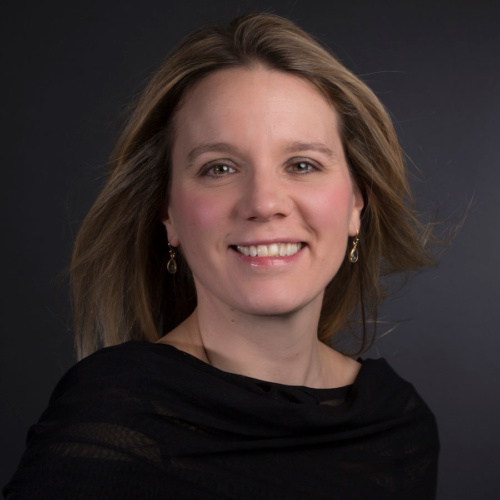
Grace Davidson
Grace Davidson is a British soprano who specializes first and foremost in the performance and recording of Baroque music. Grace grew up in a house whose hallway was entirely filled by a grand piano which was being stored for a friend of the family–music was physically unavoidable. She learned the piano and the violin but it was singing that she loved best.
Taken to Cats when she was three years old she sang along throughout or, rather, whenever her mother’s hand wasn’t clamped over her mouth. And it was her singing that won her a scholarship to the Royal Academy of Music where she won the Early Music Prize. Since then she has worked as a soloist with leading Baroque ensembles, under the batons of Sir John Eliot Gardner, Paul McCreesh, Philippe Herreweghe and Harry Christophers.
Her discography includes a decade of recordings with The Sixteen, many of which feature her as soloist–Handel’s Jeptha (as Angel), Dixit Dominus, Monteverdi’s Vespers of 1610, Pianto della Madonna, Acis and Galatea (as Galatea) and the Lutheran Masses of Bach. On Radio Three’s Building a Library, her singing in Fauré’s Requiem (with the London Symphony Orchestra and Tenebrae, Nigel Short conducting) was reviewed by Richard Morrison quite simply: “Grace Davidson’s Pie Jesu is matchless.”
Grace’s purity of tone has attracted many of the leading contemporary composers to write for her, most notably Max Richter, who chose her as the solo singer for many of his works, such as Sleep. This piece–lasting all night–has now been performed all over the world, including a performance in 2019 on the Great Wall of China. Recent solo recordings for Signum Records are Vivaldi & Handel, a disc of sacred solo cantatas with the Academy of Ancient Music, and John Dowland: First Booke of Songes Or Ayres with lutenist David Miller.

Violet Skies
You’ll be familiar with Violet Skies without realising it. Having spent the last few years writing for other artists around the world, as well as founding sheWrites, a global series of female-only writing camps, Violet Skies is setting up her stall alongside her artist peers; a Welsh Singer-Songwriter with ambition as big as her voice.
Growing up in a village in Wales, UK, she’s a self-confessed nerd, perfectionist and has known since the age of 4 that music was her future. Violet Skies, (adopting her grandmother’s name) writes “pop with teeth” and co-produces all her music; a combination of searingly emotional vocals, uncomfortably honest lyrics about her relationships, and infectious melodies.
The resulting output walks a fine line between making you cry about an ex you thought you were over–and laugh about the one you’re glad got away.
If it’s not already clear, she’s not content with the definitions of what it is to be a female Singer-Songwriter. She’s somewhere between Adele and Robyn; a product of her parents’ eclectic musical tastes and a 90’s childhood.
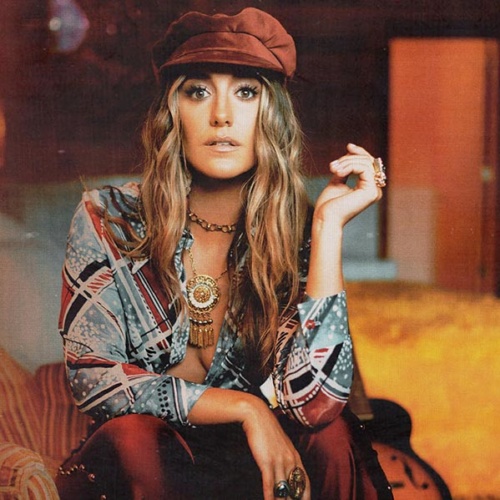
Lainey Wilson
Pinned as an “Artist to Watch” in 2020 by Pandora, The Boot, and Sounds Like Nashville and included in CMT’s “Next Women of Country” program, Wilson kicked off the year by making her Grand Ole Opry debut—a dream come true for the Baskin, Louisiana native.
Hailing from the small farming community, Wilson moved to Nashville in a bumper-pull camper trailer to pursue a career in music and has been carving her own unique place in the country music landscape ever since, garnering praise for her “unabashedly down-home and unflappably worldly” (NPR) style and exhibiting “just enough scars and pragmatism to write great, universal country songs” (Taste of Country).
Produced by GRAMMY Award-winning mastermind Jay Joyce, Wilson’s music has had multiple TV placements with Paramount’s hit series Yellowstone and her current single “Things A Man Oughta Know” continues to gain traction across radio and streaming platforms alike, garnering over 15 million streams to date and repeatedly landing on SXMTheHighway’s Hot 30 Countdown.


